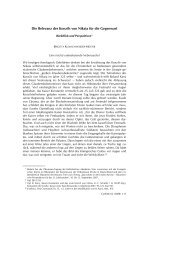- Page 4 and 5: Internacionalización y capital hum
- Page 6 and 7: Marta Muñiz Ferrer Jesús Labrador
- Page 8 and 9: ÍNDICE Prólogo ..................
- Page 10 and 11: PRÓLOGO Matías Delgado-Ureña VP
- Page 12 and 13: PRESENTACIÓN Dra. Marta Muñiz Fer
- Page 14 and 15: PRESENTACIÓN internacionalización
- Page 16 and 17: PRESENTACIÓN Internacionalización
- Page 18 and 19: PRESENTACIÓN En cuanto a los retos
- Page 20 and 21: PRESENTACIÓN ras internacionales.
- Page 22 and 23: PRESENTACIÓN de la gestión de la
- Page 24: BLOQUE I GLOBALIZACIÓN E INTERNACI
- Page 27 and 28: INTERNAcionaLIZACIÓN Y CAPITAL HUM
- Page 29: INTERNAcionaLIZACIÓN Y CAPITAL HUM
- Page 33 and 34: INTERNAcionaLIZACIÓN Y CAPITAL HUM
- Page 35 and 36: INTERNAcionaLIZACIÓN Y CAPITAL HUM
- Page 38 and 39: EL mundo hoy. Gestión de la divers
- Page 40 and 41: EL mundo hoy. Gestión de la divers
- Page 42 and 43: EL mundo hoy. Gestión de la divers
- Page 44 and 45: EL mundo hoy. Gestión de la divers
- Page 46 and 47: EL mundo hoy. Gestión de la divers
- Page 48: EL mundo hoy. Gestión de la divers
- Page 51 and 52: INTERNAcionaLIZACIÓN Y CAPITAL HUM
- Page 53 and 54: INTERNAcionaLIZACIÓN Y CAPITAL HUM
- Page 55 and 56: INTERNAcionaLIZACIÓN Y CAPITAL HUM
- Page 57 and 58: INTERNAcionaLIZACIÓN Y CAPITAL HUM
- Page 59 and 60: los años ochenta, Iberoamérica co
- Page 61 and 62: INTERNAcionaLIZACIÓN Y CAPITAL HUM
- Page 63 and 64: INTERNAcionaLIZACIÓN Y CAPITAL HUM
- Page 65 and 66: INTERNAcionaLIZACIÓN Y CAPITAL HUM
- Page 67 and 68: es que la crisis financiera está c
- Page 69 and 70: INTERNAcionaLIZACIÓN Y CAPITAL HUM
- Page 71 and 72: INTERNAcionaLIZACIÓN Y CAPITAL HUM
- Page 73 and 74: INTERNAcionaLIZACIÓN Y CAPITAL HUM
- Page 75 and 76: INTERNAcionaLIZACIÓN Y CAPITAL HUM
- Page 77 and 78: INTERNAcionaLIZACIÓN Y CAPITAL HUM
- Page 79 and 80: INTERNAcionaLIZACIÓN Y CAPITAL HUM
- Page 81 and 82:
INTERNAcionaLIZACIÓN Y CAPITAL HUM
- Page 83 and 84:
INTERNAcionaLIZACIÓN Y CAPITAL HUM
- Page 85 and 86:
INTERNAcionaLIZACIÓN Y CAPITAL HUM
- Page 87 and 88:
INTERNAcionaLIZACIÓN Y CAPITAL HUM
- Page 89 and 90:
INTERNAcionaLIZACIÓN Y CAPITAL HUM
- Page 91 and 92:
INTERNAcionaLIZACIÓN Y CAPITAL HUM
- Page 93 and 94:
INTERNAcionaLIZACIÓN Y CAPITAL HUM
- Page 96:
BLOQUE II MOVILIDAD DE LOS RECURSOS
- Page 99 and 100:
INTERNAcionaLIZACIÓN Y CAPITAL HUM
- Page 101 and 102:
INTERNAcionaLIZACIÓN Y CAPITAL HUM
- Page 103 and 104:
INTERNAcionaLIZACIÓN Y CAPITAL HUM
- Page 105 and 106:
INTERNAcionaLIZACIÓN Y CAPITAL HUM
- Page 107 and 108:
INTERNAcionaLIZACIÓN Y CAPITAL HUM
- Page 109 and 110:
INTERNAcionaLIZACIÓN Y CAPITAL HUM
- Page 111 and 112:
INTERNAcionaLIZACIÓN Y CAPITAL HUM
- Page 113 and 114:
INTERNAcionaLIZACIÓN Y CAPITAL HUM
- Page 115 and 116:
INTERNAcionaLIZACIÓN Y CAPITAL HUM
- Page 117 and 118:
INTERNAcionaLIZACIÓN Y CAPITAL HUM
- Page 119 and 120:
INTERNAcionaLIZACIÓN Y CAPITAL HUM
- Page 121 and 122:
INTERNAcionaLIZACIÓN Y CAPITAL HUM
- Page 123 and 124:
INTERNAcionaLIZACIÓN Y CAPITAL HUM
- Page 125 and 126:
INTERNAcionaLIZACIÓN Y CAPITAL HUM
- Page 127 and 128:
INTERNAcionaLIZACIÓN Y CAPITAL HUM
- Page 129 and 130:
INTERNAcionaLIZACIÓN Y CAPITAL HUM
- Page 131 and 132:
INTERNAcionaLIZACIÓN Y CAPITAL HUM
- Page 133 and 134:
INTERNAcionaLIZACIÓN Y CAPITAL HUM
- Page 135 and 136:
INTERNAcionaLIZACIÓN Y CAPITAL HUM
- Page 137 and 138:
INTERNAcionaLIZACIÓN Y CAPITAL HUM
- Page 139 and 140:
INTERNAcionaLIZACIÓN Y CAPITAL HUM
- Page 141 and 142:
INTERNAcionaLIZACIÓN Y CAPITAL HUM
- Page 144 and 145:
The SucceSSful AdapTATion of ExpATr
- Page 146 and 147:
The Successful Adaptation of Expatr
- Page 148 and 149:
The Successful Adaptation of Expatr
- Page 150 and 151:
The Successful Adaptation of Expatr
- Page 152 and 153:
The Successful Adaptation of Expatr
- Page 154 and 155:
The Successful Adaptation of Expatr
- Page 156 and 157:
The Successful Adaptation of Expatr
- Page 158 and 159:
The Successful Adaptation of Expatr
- Page 160 and 161:
The Successful Adaptation of Expatr
- Page 162 and 163:
The Successful Adaptation of Expatr
- Page 164:
The Successful Adaptation of Expatr
- Page 167 and 168:
INTERNAcionaLIZACIÓN Y CAPITAL HUM
- Page 169 and 170:
INTERNAcionaLIZACIÓN Y CAPITAL HUM
- Page 171 and 172:
INTERNAcionaLIZACIÓN Y CAPITAL HUM
- Page 173 and 174:
INTERNAcionaLIZACIÓN Y CAPITAL HUM
- Page 175 and 176:
INTERNAcionaLIZACIÓN Y CAPITAL HUM
- Page 177 and 178:
INTERNAcionaLIZACIÓN Y CAPITAL HUM
- Page 179 and 180:
INTERNAcionaLIZACIÓN Y CAPITAL HUM
- Page 181 and 182:
INTERNAcionaLIZACIÓN Y CAPITAL HUM
- Page 183 and 184:
INTERNAcionaLIZACIÓN Y CAPITAL HUM
- Page 185 and 186:
INTERNAcionaLIZACIÓN Y CAPITAL HUM
- Page 187 and 188:
INTERNAcionaLIZACIÓN Y CAPITAL HUM
- Page 189 and 190:
INTERNAcionaLIZACIÓN Y CAPITAL HUM
- Page 191 and 192:
INTERNAcionaLIZACIÓN Y CAPITAL HUM
- Page 193 and 194:
INTERNAcionaLIZACIÓN Y CAPITAL HUM
- Page 195 and 196:
INTERNAcionaLIZACIÓN Y CAPITAL HUM
- Page 197 and 198:
INTERNAcionaLIZACIÓN Y CAPITAL HUM
- Page 199 and 200:
INTERNAcionaLIZACIÓN Y CAPITAL HUM
- Page 201 and 202:
INTERNAcionaLIZACIÓN Y CAPITAL HUM
- Page 203 and 204:
INTERNAcionaLIZACIÓN Y CAPITAL HUM
- Page 205 and 206:
INTERNAcionaLIZACIÓN Y CAPITAL HUM
- Page 207 and 208:
INTERNAcionaLIZACIÓN Y CAPITAL HUM
- Page 209 and 210:
INTERNAcionaLIZACIÓN Y CAPITAL HUM
- Page 211 and 212:
INTERNAcionaLIZACIÓN Y CAPITAL HUM
- Page 213 and 214:
INTERNAcionaLIZACIÓN Y CAPITAL HUM
- Page 215 and 216:
Openness to experience 51.78 63.33
- Page 217 and 218:
INTERNAcionaLIZACIÓN Y CAPITAL HUM
- Page 219 and 220:
INTERNAcionaLIZACIÓN Y CAPITAL HUM
- Page 221 and 222:
INTERNAcionaLIZACIÓN Y CAPITAL HUM
- Page 223 and 224:
INTERNAcionaLIZACIÓN Y CAPITAL HUM
- Page 225 and 226:
INTERNAcionaLIZACIÓN Y CAPITAL HUM
- Page 227 and 228:
INTERNAcionaLIZACIÓN Y CAPITAL HUM
- Page 229 and 230:
INTERNAcionaLIZACIÓN Y CAPITAL HUM
- Page 231 and 232:
INTERNAcionaLIZACIÓN Y CAPITAL HUM
- Page 233 and 234:
INTERNAcionaLIZACIÓN Y CAPITAL HUM
- Page 235 and 236:
INTERNAcionaLIZACIÓN Y CAPITAL HUM
- Page 237 and 238:
INTERNAcionaLIZACIÓN Y CAPITAL HUM
- Page 239 and 240:
INTERNAcionaLIZACIÓN Y CAPITAL HUM
- Page 241 and 242:
INTERNAcionaLIZACIÓN Y CAPITAL HUM
- Page 243 and 244:
INTERNAcionaLIZACIÓN Y CAPITAL HUM
- Page 245 and 246:
INTERNAcionaLIZACIÓN Y CAPITAL HUM
- Page 247 and 248:
INTERNAcionaLIZACIÓN Y CAPITAL HUM
- Page 249 and 250:
INTERNAcionaLIZACIÓN Y CAPITAL HUM
- Page 251 and 252:
INTERNAcionaLIZACIÓN Y CAPITAL HUM
- Page 253 and 254:
INTERNAcionaLIZACIÓN Y CAPITAL HUM
- Page 256 and 257:
¿Internacionalización o no? Influ
- Page 258 and 259:
¿Internacionalización o no? Influ
- Page 260 and 261:
¿Internacionalización o no? Influ
- Page 262 and 263:
¿Internacionalización o no? Influ
- Page 264 and 265:
¿Internacionalización o no? Influ
- Page 266 and 267:
¿Internacionalización o no? Influ
- Page 268 and 269:
¿Internacionalización o no? Influ
- Page 270 and 271:
¿Internacionalización o no? Influ
- Page 272 and 273:
¿Internacionalización o no? Influ
- Page 274 and 275:
¿Internacionalización o no? Influ
- Page 276 and 277:
¿Internacionalización o no? Influ
- Page 278 and 279:
¿Internacionalización o no? Influ
- Page 280 and 281:
¿Internacionalización o no? Influ
- Page 282 and 283:
¿Internacionalización o no? Influ
- Page 284 and 285:
LA GESTIÓN DE LA DIVERSIDAD DEMOGR
- Page 286 and 287:
LA GESTIÓN DE LA DIVERSIDAD DEMOGR
- Page 288 and 289:
LA GESTIÓN DE LA DIVERSIDAD DEMOGR
- Page 290 and 291:
LA GESTIÓN DE LA DIVERSIDAD DEMOGR
- Page 292 and 293:
LA GESTIÓN DE LA DIVERSIDAD DEMOGR
- Page 294 and 295:
LA GESTIÓN DE LA DIVERSIDAD DEMOGR
- Page 296 and 297:
LA GESTIÓN DE LA DIVERSIDAD DEMOGR
- Page 298 and 299:
externos, requiere que la gestión
- Page 300 and 301:
LA GESTIÓN DE LA DIVERSIDAD DEMOGR
- Page 302 and 303:
LA GESTIÓN DE LA DIVERSIDAD DEMOGR
- Page 304 and 305:
GESTIÓN DE LA DIVERSIDAD EN L’OR
- Page 306 and 307:
GESTIÓN DE LA DIVERSIDAD EN L’OR
- Page 308 and 309:
GESTIÓN DE LA DIVERSIDAD EN L’OR
- Page 310 and 311:
GESTIÓN DE LA DIVERSIDAD EN L’OR
- Page 312 and 313:
Cuadro 6: Cuadro Impatriados 6. Imp
- Page 314 and 315:
GESTIÓN DE LA DIVERSIDAD EN L’OR
- Page 316 and 317:
GESTIÓN DE LA DIVERSIDAD EN L’OR
- Page 318 and 319:
objetivo: facilitar el acceso de lo
- Page 320 and 321:
GESTIÓN DE LA DIVERSIDAD EN L’OR
- Page 322 and 323:
La discriminación en los procesos
- Page 324 and 325:
La discriminación en los procesos
- Page 326 and 327:
La discriminación en los procesos
- Page 328 and 329:
La discriminación en los procesos
- Page 330 and 331:
La discriminación en los procesos
- Page 332 and 333:
La discriminación en los procesos
- Page 334 and 335:
La discriminación en los procesos
- Page 336 and 337:
La discriminación en los procesos
- Page 338 and 339:
La discriminación en los procesos
- Page 340 and 341:
La discriminación en los procesos
- Page 342 and 343:
La discriminación en los procesos
- Page 344 and 345:
La discriminación en los procesos
- Page 346:
La discriminación en los procesos

















